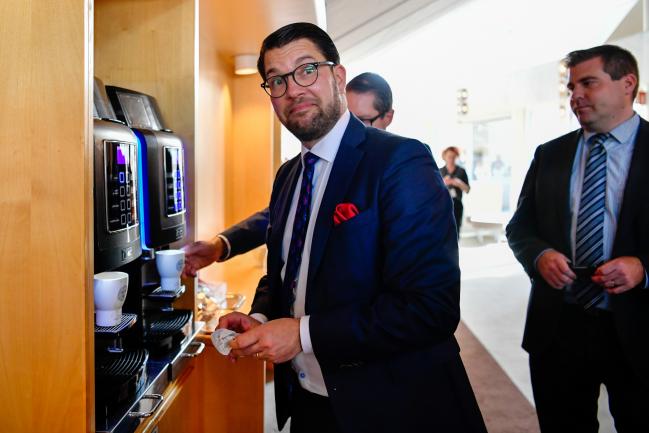(Bloomberg) -- Stefan Lofven was defiant after becoming the first Swedish prime minister in history to be ousted by a confidence vote in parliament.
The 61-year-old was voted out of office on Tuesday after the center-right opposition and the nationalists teamed up to end four years of Social Democratic rule. But deeper cooperation between the two looks harder to come by. There are substantial misgivings within the four-party Alliance about working with the Sweden Democrats, a party with neo-Nazi roots.
The Alliance’s push for power is “unrealistic” since they have promised to rule without support from the nationalists, Lofven said at a press conference after his ouster. He vowed “never” to act as a support party for his rival bloc, saying he has his sights set on returning as premier.
There are few signs of the other side budging to break the impasse in place since the election two weeks ago, which saw Lofven’s coalition emerge weakened with a lead of just one seat over the opposition. The Sweden Democrats won 62 seats in the 349-person legislature, meaning there’s no clear path to power for either bloc.
Lofven had refused to step down, pointing to his narrow lead and calling for broad government talks to keep the nationalists from gaining influence.
The nation now awaits as the new speaker will start talks on Thursday with all the party leaders to break the deadlock. Sweden can go through four attempts to get a cabinet approved in parliament before a new election has to be held.
Ulf Kristersson, leader of the largest opposition party, the Moderates, said the vote was never in doubt as he presses for an Alliance government. “There was a clear majority that the government shouldn’t stay,” he said. “That’s the starting point. Now it’s up to the speaker to assess the options.”
Speaker Rounds
The defeat of Lofven followed a move by the Alliance and the Sweden Democrats to elect a new speaker, Andreas Norlen. While a member of the Moderates, Norlen has emphasized that it’s important for the speaker to stand above party politics. Lofven will also remain as a caretaker prime minister until a new government is confirmed.
It’s clear that somewhere a compromise has to be made. The Alliance is split on whether to seek further support from the nationalists, with the more pro-immigration Center and Liberal parties strongly against cooperation, while the Moderates and Christian Democrats are more open to using its support.
Seeking Talks
On the other sides, both the Sweden Democrats and the Social Democrats are working to split the Alliance, seeking either a smaller right-wing government or a broader bipartisan coalition. The Liberal and Center parties are pushing for an Alliance government that has backing from the Social Democrats, which Lofven rejects.
Center Party leader Annie Loof, who has been floated as a compromise prime minister contender, said both sides now need to cooperate and discuss with one another.
“Lofven has dedicated his whole political life to advocating for understanding over bloc lines,” she said. “It’s a good opportunity to use the coming days for serious and constructive discussions.”
The Liberal Party has said there will be no Alliance government without support from the Social Democrats.
Sweden has never gone beyond round one in government, but has rarely had such a deadlocked situation. The Sweden Democrats has also vowed that it won’t back any government without getting concessions.
A new election still seems “unlikely,”said Torbjorn Isaksson, chief analyst at Nordea Bank. “But with Norlen as speaker the probability increases that the new PM will be Ulf Kristersson.”
Sweden Democrats leader Jimmie Akesson said on Tuesday that speaker has “a very difficult job ahead of him.”
“I’m not here to stir up trouble,” he said after the vote on Tuesday. “I don’t think that we are going to let through a government that doesn’t have the right conditions to rule the country.”
The party has already been successful in shifting the Swedish debate, with almost all groups now advocating for stricter immigration limits and more law and order. The party saw a surge in support after Sweden was flooded by migrants during the refugee crisis over the past few years and also gained followers after the global financial crisis, echoing similar voter shifts across Europe, the U.S. and Asia.
The party has been trying to become more palatable to the mainstream parties, kicking out its most extreme members.
Mattias Karlsson, the group leader of the Sweden Democrats, said the most important issue now will be what migration policy any potential Alliance government offers. “It may fail already there,” he said.
Sweden needs a halt to asylum seekers, Karlsson said. The best alternative is a Moderate and Christian Democrat coalition government that is “tolerated” by us and the Center and Liberal parties, he said.
